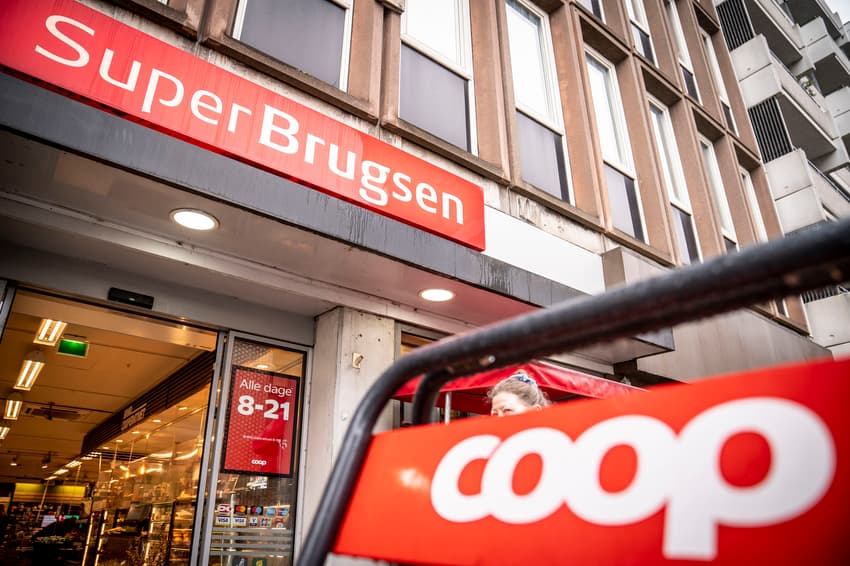Denmark's Coop supermarkets to bring in new PFAS-free label

Denmark's Coop supermarket company, which runs the SuperBrugsen, Kvickly, and 365 discount stores, has brought in a new PFAS-free label, which it will stick on frying pans and other goods which do not use the controversial "forever chemical".
The "Fri for PFAS" label will appear at all supermarkets owned by the company from Monday morning.
"We have come a long way, and we have succeeded in phasing out PFAS from many product groups," Signe D Frese, the company's CSR director said in a press release.
"With the phasing out of frying pans and other baking items with PFAS from our own brands, we have come a step closer to the goal of a PFAS-free range in all stores," she said.
The label will provide information to customers giving them the option to buy products that are free from PFAS, the company said.
Coop has already forbidden PFAS in its paper products, including packaging, as well as in cosmetics and healthcare products, tooth floss, floor cleaner, textiles, shoes, and furniture.
The Fri for PFAS label will initially be used on kitchen and baking items, the company said.
This means that Coop’s in-house brands Coop, Holms Deli, GreenChef and Micki will carry the labelling.
READ ALSO: Danish Conservatives want national ban on ‘forever chemical’ PFAS
What are PFAS?
PFAS (per- and polyfluoroalkyl substances) are a large group of synthetic chemicals used in various products since the early 1950s. Their past uses include foam in fire extinguishers, food packaging and in textiles, carpets and paints. Also known as ‘forever chemicals’, they persist in water and soil and can cause harm to human health.
Due to their chemical properties, they take a long time to break down and can be found in very low concentrations in blood samples from populations all over the world.
They are, however, unwanted in the environment because they have been found to have concerning links to health complications. Their use in materials which come into contact with foods, like paper and card, has been banned in Denmark since 2020.
PFAS have been linked to a series of health complications and, if ingested in high enough amounts, are suspected of causing liver damage, kidney damage, elevated cholesterol levels, reduced fertility, hormonal disturbances, weaker immune systems, negatively affecting foetal development and being carcinogenic.
READ ALSO: PFAS pollution: What do people living in Denmark need to know?
Comments
See Also
The "Fri for PFAS" label will appear at all supermarkets owned by the company from Monday morning.
"We have come a long way, and we have succeeded in phasing out PFAS from many product groups," Signe D Frese, the company's CSR director said in a press release.
"With the phasing out of frying pans and other baking items with PFAS from our own brands, we have come a step closer to the goal of a PFAS-free range in all stores," she said.
The label will provide information to customers giving them the option to buy products that are free from PFAS, the company said.
Coop has already forbidden PFAS in its paper products, including packaging, as well as in cosmetics and healthcare products, tooth floss, floor cleaner, textiles, shoes, and furniture.
The Fri for PFAS label will initially be used on kitchen and baking items, the company said.
This means that Coop’s in-house brands Coop, Holms Deli, GreenChef and Micki will carry the labelling.
READ ALSO: Danish Conservatives want national ban on ‘forever chemical’ PFAS
What are PFAS?
PFAS (per- and polyfluoroalkyl substances) are a large group of synthetic chemicals used in various products since the early 1950s. Their past uses include foam in fire extinguishers, food packaging and in textiles, carpets and paints. Also known as ‘forever chemicals’, they persist in water and soil and can cause harm to human health.
Due to their chemical properties, they take a long time to break down and can be found in very low concentrations in blood samples from populations all over the world.
They are, however, unwanted in the environment because they have been found to have concerning links to health complications. Their use in materials which come into contact with foods, like paper and card, has been banned in Denmark since 2020.
PFAS have been linked to a series of health complications and, if ingested in high enough amounts, are suspected of causing liver damage, kidney damage, elevated cholesterol levels, reduced fertility, hormonal disturbances, weaker immune systems, negatively affecting foetal development and being carcinogenic.
READ ALSO: PFAS pollution: What do people living in Denmark need to know?
Join the conversation in our comments section below. Share your own views and experience and if you have a question or suggestion for our journalists then email us at [email protected].
Please keep comments civil, constructive and on topic – and make sure to read our terms of use before getting involved.
Please log in here to leave a comment.